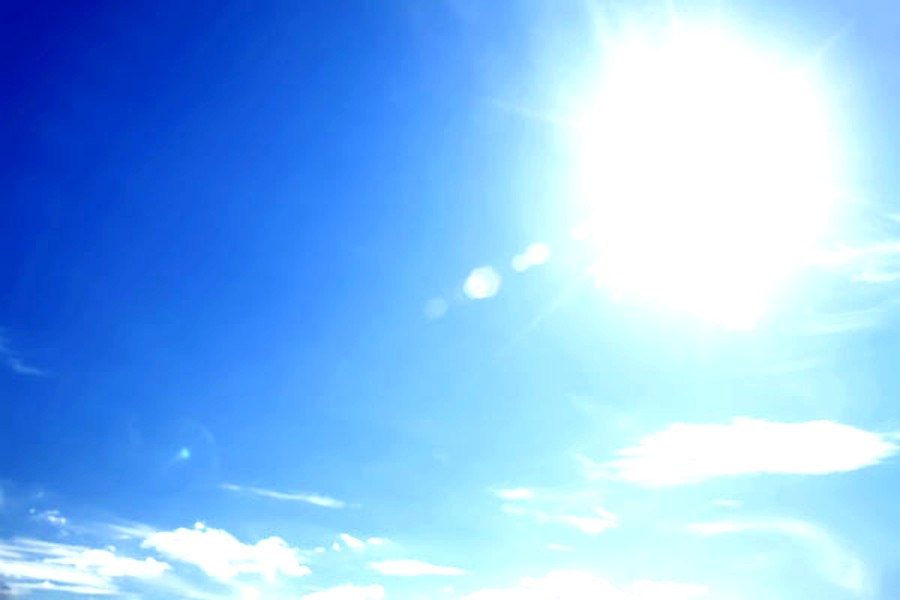
Extreme heat is the most dangerous type of severe-weather event from Harlem to Harare.
We can take action to prepare our loved ones and communities for extreme heat events and related power outages.
Learn what to do before, during, and after to help keep everyone safe and healthy.
Ensure you know the types of notifications you will receive and what to do when you receive them. The National Weather Service issues heat advisories and excessive heat warnings when unusual periods of hot weather are expected.
Listen to local weather forecasters. You may hear these terms when a heat wave is predicted in your community:
Excessive Heat Outlook
Be Aware! An excessive heat outlook is issued when the potential exists for an excessive heat event in the next 3- 7 days.
It provides information to individuals who need considerable lead time to prepare for the event.
Excessive Heat Watch
Be Prepared! A heat watch is issued when conditions are favorable for an excessive heat event in the next 24 to 72 hours.
It is used when the risk of an extreme heat event has increased, but its occurrence and timing is still uncertain.
Excessive Heat Warning/Advisory
Take Action! An excessive heat warning or a heat advisory is issued within 12 hours of the onset of extremely dangerous heat conditions.
Take precautions immediately to avoid heat-related illness.
What Should You Do Before a Heat Wave?
Learn How to Stay Hydrated
- Drinking enough water is one of the most important things you can do to prevent heat-related illness. An average person needs to drink about three-quarters of a gallon of fluid daily.
- Stay away from sugary, caffeinated and alcoholic drinks.
- In general, eating meals and snacks throughout the day with adequate water intake is enough to maintain electrolytes and replace salt lost when you sweat.
- Certain medical conditions and medications may mean you need to drink more water. Talk to your healthcare provider.
Gather Water & Emergency Supplies
Gather food, water, and medicine in advance because stores and pharmacies might be closed.
Organize your supplies into a Go-Kit and a Stay-at-Home Kit.
- Go-Kit: 3 days of supplies that you can easily carry with you.
- Stay-at-Home Kit: 2 weeks of supplies if you need to stay at home.
- Have a 1-month supply of medication in a child-proof container.
- Keep personal, financial, and medical records safe.
Take Actions to Keep Your Home Cool
- Cover windows with drapes or shades.
- Weather-strip doors and windows.
- Use window reflectors, such as aluminum foil-covered cardboard, to reflect heat back outside.
- Add insulation to keep the heat out.
- Use a powered attic ventilator or attic fan to regulate the heat level of your attic by clearing hot air.
- Install window air conditioners and insulate around them.
Plan to Go to a Cool Place
Spending a few hours each day in air conditioning can help prevent or reduce heat-related illness.
If you do not have air conditioning in your home, identify a place where you can spend the warmest part of the day during an extreme heat event.
- Contact a nearby neighbor, friend or relative who has air conditioning.
- Check to see if shopping malls or public libraries are open.
- Find out if your community plans to open public cooling centers.
What Should You Do During a Heat Wave?
Stay Connected
- Never leave infants, children, older adults, individuals with disabilities or pets in a vehicle unattended. Cars can quickly heat up to dangerous temperatures, even with a window cracked open.
- Check-in on older adults and individuals with chronic health conditions at least twice daily. When visiting, ask yourself these questions:
- Are they drinking enough water?
- Do they have access to air conditioning?
- Do they know how to keep cool?
- Do they show any signs of heat stress?
- Be on the lookout for signs of heat-related illness. Act right away if you notice someone with symptoms.
- If someone is showing signs of heat exhaustion or heat stroke seek emergency medical care immediately (go to emergency medical care in NYC).
Stay Hydrated
- Drink plenty of fluids: Don’t wait until you’re thirsty to drink. Avoid sugary, caffeinated or alcoholic drinks. Avoid icy beverages because they can cause stomach cramps.
- Replace salt and minerals: Heavy sweating removes salt and minerals from your body that need to be replaced. A sports drink or a snack can replace the salt and minerals you lose in sweat.
- Keep pets hydrated: Provide plenty of fresh water for your pets and leave the water in a shady area.
- Warning: If your doctor limits the amount of water you drink or has you on water pills, ask how much you should drink while the weather is hot. If you are on a low-salt diet, have diabetes, high blood pressure, or other chronic conditions, talk with your doctor before drinking a sports beverage.
Stay Cool
- Stay cool indoors: Not Kool in the Gang Cool, we mean staying in an air-conditioned place as much as possible.
- Wear appropriate clothing: Choose lightweight, light-colored, and loose-fitting clothing.
- Don’t use an electric fan when the indoor air temperature is over 95°F. Using a fan can be more harmful than helpful when indoor air temperatures are hotter than your body temperature. Fan use may cause your body to gain heat instead of losing it. Focus on staying hydrated, taking a cool shower or bath to cool your body, shutting out the sun and heat with curtains, and moving to an air conditioned place to cool off.
- Use your stove and oven less.
- Schedule outdoor work and other activities carefully: Try to limit your outdoor activity to when it’s coolest, such as morning and evening hours. Rest often in shady areas so that your body has a chance to recover.
- Cut down on exercise during the heat.
- When outdoors, protect yourself from the sun by wearing a wide-brimmed hat, sunglasses, and sunscreen that says “broad spectrum” or “UVA/UVB protection.”
How Can You Stay Safe After a Heat Wave?
Safety Basics
- If the power is out, use flashlights or battery-powered lanterns instead of candles to reduce the risk of fires.
- TIP: If you start to feel sick, dizzy, or weak, get to fresh air right away — do not delay.
- Prevent carbon monoxide poisoning. Do not use gasoline, propane, natural gas, or charcoal-burning devices inside a home, basement, garage, tent, or camper — or even outside near an open window. Carbon monoxide can’t be seen or smelled, but it can kill you fast.
Tips to Stay Healthy
- When in doubt, throw it out! Throw out food that got wet or warm.
- Ask your healthcare provider or doctor about using refrigerated medicines that got warm.
Take Care of Yourself
- It’s normal to have a lot of feelings.
- Eat healthy food and get enough sleep to help you deal with stress.
- You can contact the Disaster Distress Helpline for free if you need to talk to someone at 1-800-985-5990 or text “TalkWithUs’ to 66746.
How to Treat Heat-Related Illnesses
During heat waves people are susceptible to three heat-related conditions. Here’s how to recognize and respond to them.
How to Recognize and Treat Heat Cramps
Heat cramps are muscle spasms, often in the abdomen, arms or calves, caused by a large loss of salt and water in the body.
What to look for:
- Heavy sweating during intense exercise
- Muscle pain or spasms
What to do:
- Stop physical activity and move the person to a cool place
- Have the person drink water or a sports drink
- Instruct the person to wait for cramps to go away before resuming physical activity
Get medical help right away if cramps last longer than 1 hour.
How to Recognize and Treat Heat Exhaustion
Heat exhaustion is a severe heat-related illness requiring emergency medical treatment.
What to look for:
- Heavy sweating
- Cold, pale, and clammy skin
- Fast, weak pulse
- Nausea or vomiting
- Muscle cramps
- Tiredness or weakness
- Dizziness
- Headache
- Brief fainting (passing out)
What to do:
- Move the person to a cool place
- Loosen their clothes
- Put cool, wet cloths on their body, use misting and fanning, or help them take a cool bath
- Have the person sip water
Get medical help right away if:
- Vomiting occurs
- Symptoms get worse
- Symptoms last longer than 1 hour
- Confusion develops
How to Recognize and Treat Heat Stroke
Heat stroke is the most serious medical condition caused by extreme heat. It requires immediate emergency treatment. It can result in death without immediate medical attention.
What to look for:
- High body temperature (104°F or higher)
- Hot, red, dry or damp skin
- Fast, strong pulse
- Headache
- Dizziness
- Nausea
- Confusion
- Losing consciousness (passing out)
What to do:
Call 911 right away — heat stroke is a medical emergency, then:
- Move the person to a cooler place
- Help lower the person’s temperature with a cool or cold bath, misting, fanning or applying cool cloths, if a bath is not available.
- Do not give the person anything to drink.
Download the Heat Wave Safety Checklist
Checklist Available in Multiple Languages
For more information go to the Red Cross.
Become a Harlem Insider!
By submitting this form, you are consenting to receive marketing emails from: Harlem World Magazine, 2521 1/2 west 42nd street, Los Angeles, CA, 90008, https://www.harlemworldmagazine.com. You can revoke your consent to receive emails at any time by using the SafeUnsubscribe® link, found at the bottom of every email. Emails are serviced by Constant Contact








